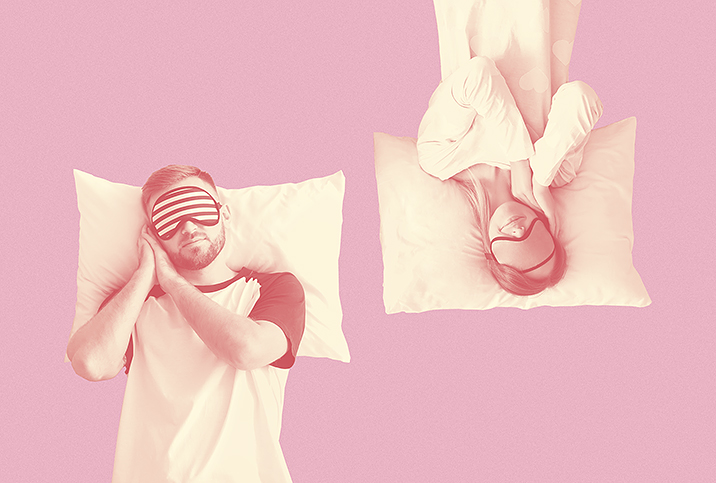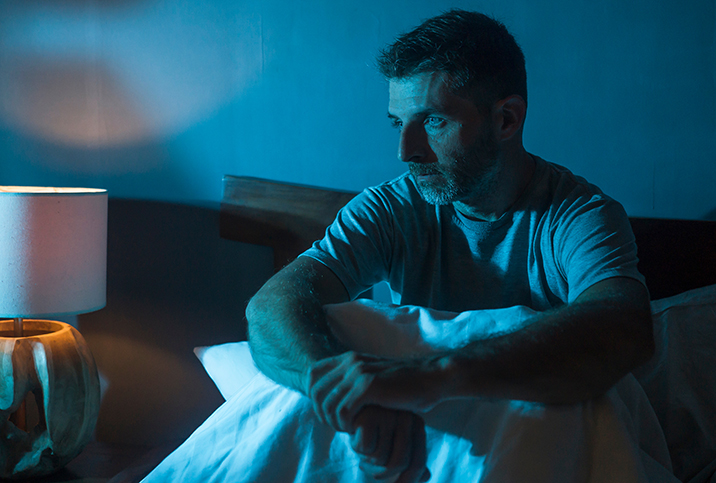Why My Fiancé and I Are Considering a Sleep Divorce

While I despise the name, sleep divorce is a pretty good description of what it is—sleeping in separate beds from your partner for a consistent amount of time. For many of us, stressed out from work and family demands and the pandemic, getting a good night’s sleep can be rough. According to the Kaiser Family Foundation, 36 percent of Americans reported difficulty sleeping due to the ongoing COVID crisis.
If you’re tired of iPad glare in your face or your sweet beloved snoring loudly, join the roughly one-third of American couples ready to give sleep divorcing a try. It can be temporary to see how it works, but many benefit from a more permanent arrangement given chronic sleep deprivation can cause long-term medical conditions such as obesity, diabetes and depression.
Why we’re thinking about sleep divorcing
My fiancé and I have been sleeping in separate bedrooms for years now. We both come from religious backgrounds, and we wanted to be respectful of our parents’ wishes. Over the years, though, we’ve found that we enjoy having our own separate spaces. It’s nice to have a place I can retreat to when needed, particularly during the pandemic when we’re both home all the time.
As far as our sleeping habits, my fiancé often has trouble sleeping or will toss and turn all night. He snores, and his legs are often restless. He also likes to go to bed promptly at 10 p.m. However, I love catching up on my TV shows in bed—the ones I love and he doesn’t. I often don’t fall asleep until midnight. When I do, I grind my teeth and have been told I will occasionally make weird noises. And then there’s Tito. For only being 35 pounds, our little dog certainly makes his presence known: He sprawls all across on our queen-sized bed.
The sleep obstacles continue into the morning. With my fiancé working 7:30 a.m. to 4:30 p.m. Monday through Friday, and me writing during the day and teaching piano lessons in the after-school hours, our schedules could hardly be more different. I wake up most mornings by 8:15, whereas he usually rises around 5:30.
All of these reasons are starting to add up to our continuing to maintain separate bedrooms after we get married this October.
What happens to intimacy?
One of the biggest questions for sleep divorcers is how to maintain intimacy and an active sex life.
To start with, it’s sort of fun to think about how we could have “sleepovers.” We can make sure to reserve time to sleep over in each other’s beds, which creates some excitement and anticipation for when we do have sex. Ultimately, sleep divorcing forces you to evaluate your time together rather than falling into a nightly routine. What’s more, not getting enough sleep can cause low libido, so choosing sleep quality over sleeping together can lead to more sex.
And let’s not forget cuddling. Physical intimacy such as cuddling and hugging can stimulate the happy hormone oxytocin and lower blood pressure. We’re planning to buy a sectional couch post-wedding, so we’re looking forward to some cuddle time as our married relationship grows.
Famous sleep divorcers
Ever since my fiancé and I have been thinking about sleep divorcing, I’ve started to pay more attention to celebrities who practice the concept. Watching “The Today Show” one morning, I was excited to learn about Carson Daly and his wife Siri’s sleep divorce. Carson and Siri started sleeping in separate bedrooms when Siri was pregnant with the couple’s fourth child in early 2020. She couldn’t get comfortable, and Carson has sleep apnea, so it just “wasn’t working,” as Carson said.
“We woke up and just shook hands like, ‘I love you, but it’s time to sleep divorce,’” he told Today.com. “I don’t know if we’ll ever sleep together again.”
Perhaps the OG sleep divorcers were Queen Elizabeth II and Prince Philip. Ostensibly, they slept apart due to an upper-class tradition, but maybe they had caught on to sleep divorcing and just didn’t admit it. Prince Philip’s cousin Lady Pamela Hicks told biographer Sally Bedell Smith: “You don’t want to be bothered with snoring or someone flinging a leg around, then when you are feeling cozy you share your room sometimes. It’s lovely to be able to choose.”
What to consider before sleep divorcing
If you think this sounds like the ideal situation for you and your partner, it may be worth thinking hard about it first and weighing your options. Be gentle with each other and don’t state or even imply that the other person’s snoring, tossing, teeth grinding or other issues are forcing you to split up. This needs to be a mutually beneficial arrangement.
It might also be worth figuring out a compromise when it comes to sleep. My fiancé and I are already considering sleeping apart on weeknights and together on weekends. That way, we can have the chance to sleep in and not worry about work or weekday responsibilities getting in the way of our sleep.
The most important thing to remember is communication. Without it, your sleep divorce can (and most likely will) fail. Happy snoozing!


















